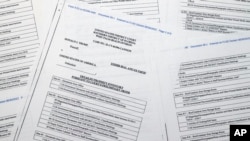A U.S. judge on Friday unsealed a detailed list of government documents and other items seized from former President Donald Trump’s Florida estate last month.
The eight-page inventory doesn’t describe the subjects of the seized materials, but it confirms the Justice Department's assertion that highly classified government documents were intermixed with other items at the Trump residence, in apparent violation of federal law.
The FBI executed the August 8 search of Trump’s property as part of a months-long investigation into how hundreds of classified government documents ended up there after Trump left office in January 2021.
The Justice Department last month released a list of items FBI agents took during the search, but the former president later asked a federal judge to both appoint an independent “special master” to review the documents and to order the release of a more detailed inventory.
Federal Judge Aileen Cannon of the Southern District of Florida ordered the unsealing of the inventory report after hearing arguments on Thursday by Trump’s lawyers and federal prosecutors over Trump’s request.
Federal prosecutors opposed Trump’s request for a special master, saying a Justice Department special team has already conducted a review of the documents and identified “privileged” material that may need to be returned to the former president.
While ordering the release of the inventory, Cannon, however, deferred an immediate decision on Trump’s request for a special master, saying she’ll issue a ruling “in due course.”
In a status review of the seized records, also unsealed Friday, federal prosecutors, wrote that the classified documents, numbering more than 100, have been segregated from the rest of the items and “separately stored in accordance with appropriate procedures governing the security of classified material.”
In a footnote, the prosecutors expressed apparent displeasure at Cannon’s order to release the information.
The evidence seized from Trump’s property, they wrote, “contains the type of information that, in the normal course, would not be shared with the owner of a premises that was searched pursuant to a court authorized search warrant.”
“Without directly saying so, they are suggesting to the court that it erred by making them file this under seal, because you usually wouldn't, as the subject in a criminal case, get this kind of information at this stage,” a former federal prosecutor said, speaking on condition of anonymity.
The inventory lists thousands of items and documents without classification marking, as well as other items, often kept alongside classified documents.
In a box taken from Trump’s office in Mar-a-Lago, 99 “Magazines/Newspapers/Press Articles and other media” from 2017 to 2018 were mixed with two confidential documents, 15 secret documents, and seven top secret documents.
In another box seized from a storage room at the premises, 30 magazines, newspapers and media clippings were intermingled with 11 confidential documents, 21 secret documents, three articles of clothing/gift items, one book, and 255 unclassified documents and photographs.






